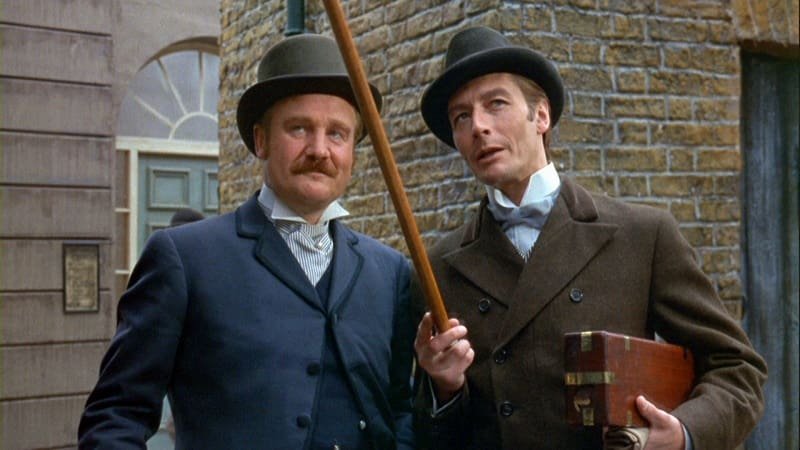
A Study In Terror (1965)
“You know my methods, Watson, I am well known to be indestructible!”
Sherlock Holmes had been done to death in the cinema long before this film hit the screens – in the Rathbone / Bruce tales Universal had got fed up of using the source material long ago, and had the hook-nosed sleuth single handedly winning the second world war for the allies.
Then Hammer had come along and made the definitive version of The Hound Of The Baskervilles, starring what many believe is the definitive Holmes (Peter Cushing).
In a bid to stave off audience malaise but still use this most recognisable of heroes, A Study In Terror takes a different tack – chucking Conan Doyle’s books in the bin, splicing Holmesian lore with the Jack The Ripper mystery, and mixing some swinging 60s zaniness with a lot of Hammer-style gore.
The film is remarkably fast-moving for a 1965 vintage – before the credits we’ve already had one cheery tart despatched with a knife through the neck, and another quickly follows, stylishly drowned in a water trough, her blood clouding the water and obscuring her face. Barbara Windsor, here at her most likeable, is the next to lose her life after a succession of red herrings and false starts. Holmes (John Neville) and Watson (Donald Houston) have only just appeared, too – giving the impression that this is less a film about them than a succession of cleverly orchestrated shocks, bringing to mind films like Horrors Of The Black Museum and Circus Of Horrors.
Holmes is at his most mystifying, baffling Watson with the most ridiculously convoluted deductions he can muster. Watson, by contrast, is at his most sycophantic – all “but Holmes, how could you possibly know that?” and “incredible, Holmes”. But their characters are cheeringly likeable – Watson in particular being a breath of fresh air after Nigel Bruce’s bumbling oaf in the Hammer film. When told to “make a scene” he does so with gusto, and the pair of them are handy with their fists in the weird, Batman-style punch-up which occurs halfway through the proceedings (in fact, the makers had actually billed the film as featuring “the original caped crusader”!).
As the deaths continue, Holmes deduces that this is a case which could involve the very top of society (a take on the Ripper case which has since been cinematically done to death) before indulging in a punch-up with a shadowy suspect as the film canters towards the standard flaming climax.
A Study In Terror is a fast moving romp – more than a little daft in places, but making up for its shortcomings by piling on the action and gore. And for a film which seemingly tears up the reference books, it’s actually remarkably faithful to Conan Doyle’s creation – featuring not only Sherlock’s brother Mycroft (Robert Morley, in a cinematic first) but also a long-suffering Inspector LeStrade, an imperfect Sherlock (he may be a dashing man of action, but he runs like a girl), and a solid, dependable Watson. And, by being quick and entertaining, it’s actually far more true to the spirit of the original short stories than some of the plodding adaptations which came later.
